Self-monitoring and self-management skills are the pinnacle of executive functioning. Students who engage in self-monitoring work toward a goal and reflect on how things are going. This requires problem solving skills because they make adjustments if needed. To effectively self-monitor and self-manage, students incorporate all their other executive function skills. This means planning, prioritizing, organizing, goal setting, emotional regulation, and initiating tasks. It’s no small task.
When done well, however, self-monitoring can have significant benefits. Students who self-monitor catch and fix errors for themselves. They’re also able to adjust strategies to make them more efficient and effective. That’s why this week, I’m sharing four strategies that can improve students’ self-management and self-monitoring skills.
Self-Monitoring Supports
Developing effective self-monitoring skills takes time, but these strategies all support that process.

Support #1: Take time to identify the expectations of a task
There’s an activity that includes a long list of tasks students should complete. The first item on the list is to read all the directions carefully before completing any tasks. Step two is to put one’s name and date on the paper. Then there are several more items like doing a math problem, drawing a box around certain words, etc.
The final item on the list is to disregard all the other items and just make sure step two (name and date) is complete.
Students often jump right into a task without taking time to understand expectations. This can result in a lot of wasted time and unnecessary diversions. And this is especially true for complex tasks that have many steps.
For tasks with multi-step directions, reserve time to highlight key steps. Every time students see an action verb, they should mark it so they can remember that part of the assignment. They can take this a step further by adding checkboxes next to those directions. As they complete each step, they can check it off. This serves as a visual reminder to follow all directions before turning in the task. Too often, students with weaker executive function skills lose points for missing directions, so this is one way to hedge against that.
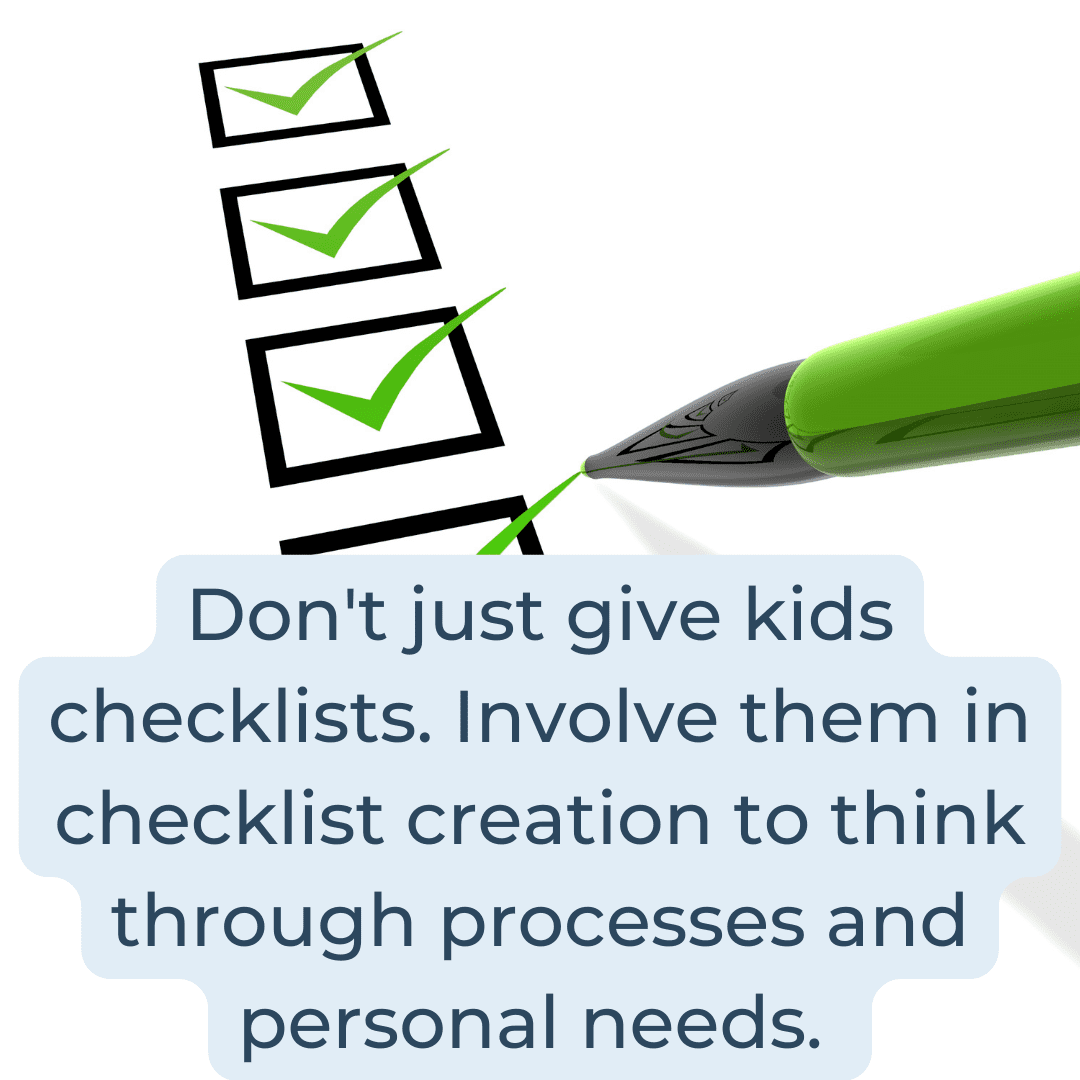
Support #2: Create checklists that reflect common errors and task milestones
Teachers sometimes provide checklists to go with assignments. But it can be even better when the student participates in creating the checklist.
Visualizing is often a challenge for students with weaker executive functioning. Breaking down a task into smaller steps helps students develop those visualization skills. The process also supports initiative because students can identify smaller tasks to tackle. They can then build momentum rather than seeing the project as an overwhelming whole.
Personalized checklists are also helpful for adapting to students’ particular needs and tendencies. Adding student-specific items can help them catch their common errors. For example, I once had a student who didn’t pay close attention to which operation he was using in math. If given a mix of different operations, he might treat all as subtraction problems. Once we added an item to his checklist to go back and confirm the operation, he caught a lot of potential errors.
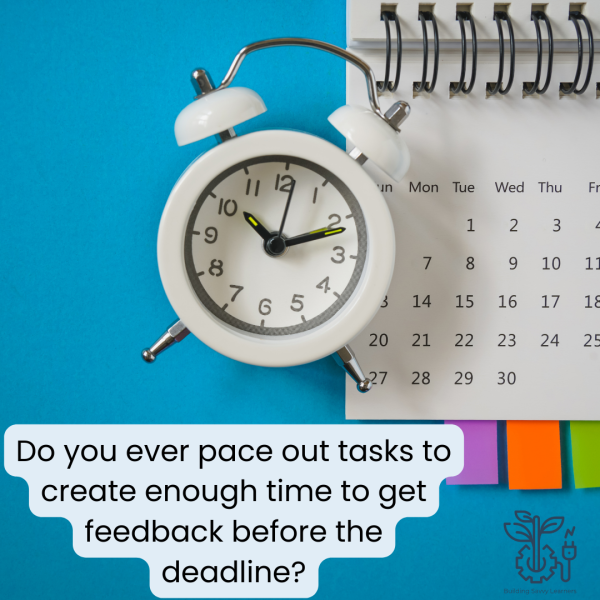
Support #3: Pace out tasks to include opportunities for feedback
When students wait until the last minute to start a task, they miss out on opportunities for feedback. But if they get a chance to share their work with others, they gain clarity over their work. They see whether their work reflects their intentions and can revise accordingly. If students don’t get that feedback along the way, they may be blindsided and disappointed by their teacher’s feedback.
Pacing out tasks also gives students time to take breaks and revisit their work with fresh eyes. They can then notice mistakes that may get overlooked when fighting through task fatigue.
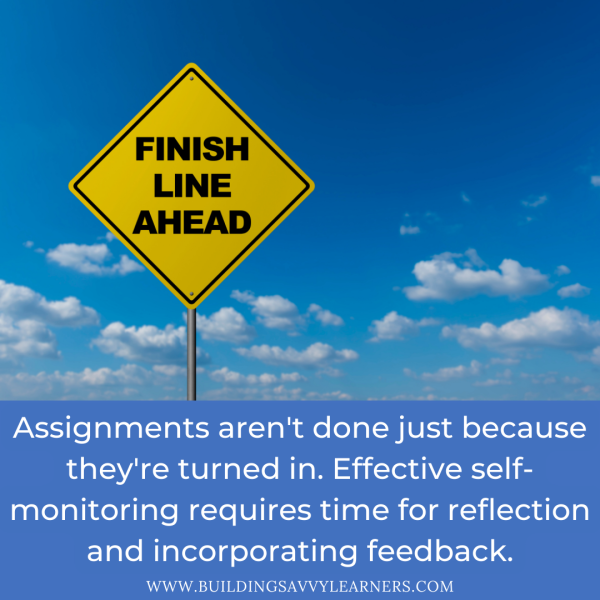
Support #4: Extend the finish line to include reflection time
So often, students consider a task “done” once they’ve turned it in to their teacher. But self-monitoring and self-management extends beyond that moment. Effective students take some time to reflect on their processes and outcomes. They consider what worked well about their process and what they would change next time. Then they look at the feedback they receive and try to connect the dots between their choices and results. Once they’ve had time to reflect, they can create a better plan for the next time they face a similar task.
Self-Monitoring Skills Take Time to Develop
There are many executive function skills at play in self-monitoring. As a result, it may take a lot of extra time and support for students to become effective in this area. But the time spent consciously working on these skills is worth the long term investment. Having students who are metacognitive—meaning they understand their learning processes and what works for them—allows them to take ownership of their learning. They can become better self-advocates and manage themselves to get the results they want in school and in their careers.
Are you wondering if your tween or teen needs extra executive function support? Be sure to check out my free guide that breaks down the different aspects of executive function to help you identify where to start. If you need extra support, I still have a few spaces left for individual coaching, and I’ll be closing the doors on my Executive Function Basics course soon!




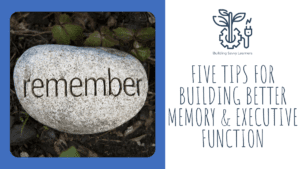




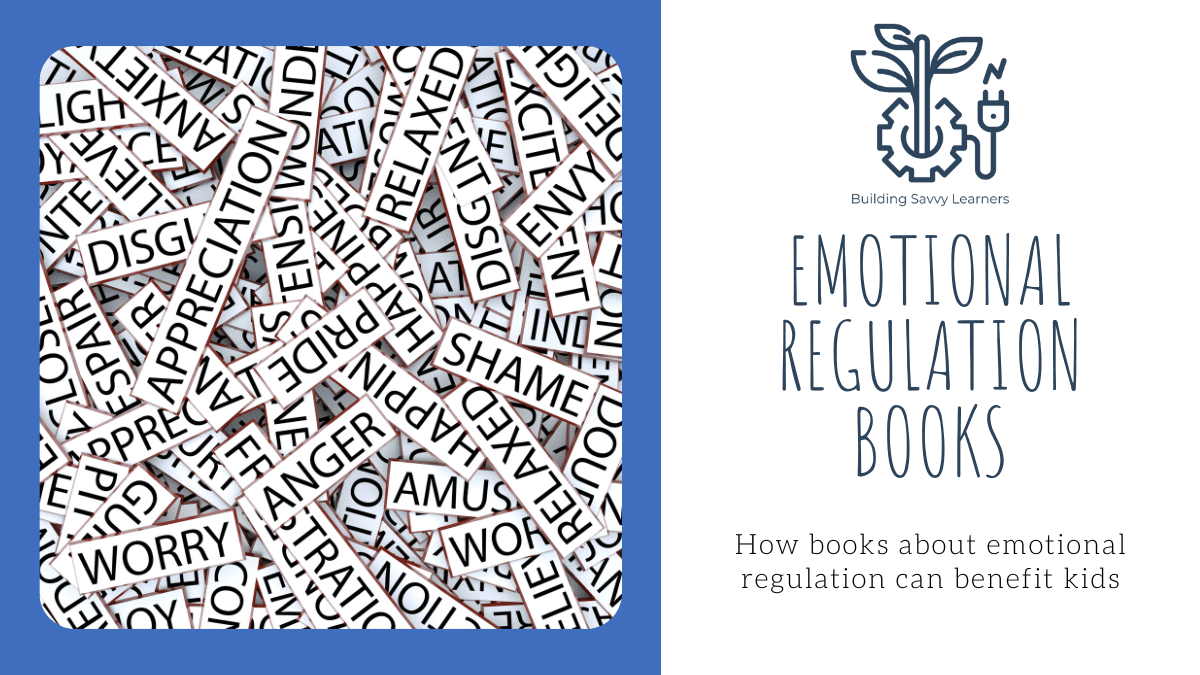
One Response
A helpful reminder as I add my 25th student on Monday. 25:1 means I have to continuing equipping my students to follow through and build patterns that keep me from repeating the instructions 500 times! I can see how I need to use pictures with my K5 to make small groups something they cancan check in their own to see if they are finished with their work!